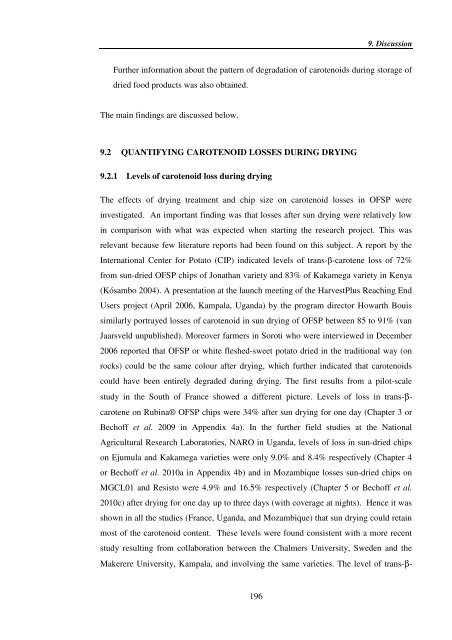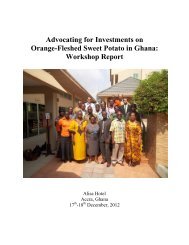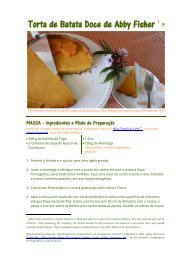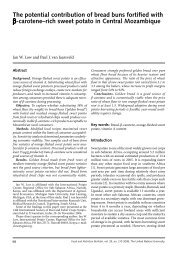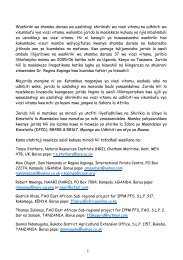Investigating carotenoid loss after drying and storage of
Investigating carotenoid loss after drying and storage of
Investigating carotenoid loss after drying and storage of
Create successful ePaper yourself
Turn your PDF publications into a flip-book with our unique Google optimized e-Paper software.
196<br />
9. Discussion<br />
Further information about the pattern <strong>of</strong> degradation <strong>of</strong> <strong>carotenoid</strong>s during <strong>storage</strong> <strong>of</strong><br />
dried food products was also obtained.<br />
The main findings are discussed below.<br />
9.2 QUANTIFYING CAROTENOID LOSSES DURING DRYING<br />
9.2.1 Levels <strong>of</strong> <strong>carotenoid</strong> <strong>loss</strong> during <strong>drying</strong><br />
The effects <strong>of</strong> <strong>drying</strong> treatment <strong>and</strong> chip size on <strong>carotenoid</strong> <strong>loss</strong>es in OFSP were<br />
investigated. An important finding was that <strong>loss</strong>es <strong>after</strong> sun <strong>drying</strong> were relatively low<br />
in comparison with what was expected when starting the research project. This was<br />
relevant because few literature reports had been found on this subject. A report by the<br />
International Center for Potato (CIP) indicated levels <strong>of</strong> trans-!-carotene <strong>loss</strong> <strong>of</strong> 72%<br />
from sun-dried OFSP chips <strong>of</strong> Jonathan variety <strong>and</strong> 83% <strong>of</strong> Kakamega variety in Kenya<br />
(Kósambo 2004). A presentation at the launch meeting <strong>of</strong> the HarvestPlus Reaching End<br />
Users project (April 2006, Kampala, Ug<strong>and</strong>a) by the program director Howarth Bouis<br />
similarly portrayed <strong>loss</strong>es <strong>of</strong> <strong>carotenoid</strong> in sun <strong>drying</strong> <strong>of</strong> OFSP between 85 to 91% (van<br />
Jaarsveld unpublished). Moreover farmers in Soroti who were interviewed in December<br />
2006 reported that OFSP or white fleshed-sweet potato dried in the traditional way (on<br />
rocks) could be the same colour <strong>after</strong> <strong>drying</strong>, which further indicated that <strong>carotenoid</strong>s<br />
could have been entirely degraded during <strong>drying</strong>. The first results from a pilot-scale<br />
study in the South <strong>of</strong> France showed a different picture. Levels <strong>of</strong> <strong>loss</strong> in trans-β-<br />
carotene on Rubina® OFSP chips were 34% <strong>after</strong> sun <strong>drying</strong> for one day (Chapter 3 or<br />
Bech<strong>of</strong>f et al. 2009 in Appendix 4a). In the further field studies at the National<br />
Agricultural Research Laboratories, NARO in Ug<strong>and</strong>a, levels <strong>of</strong> <strong>loss</strong> in sun-dried chips<br />
on Ejumula <strong>and</strong> Kakamega varieties were only 9.0% <strong>and</strong> 8.4% respectively (Chapter 4<br />
or Bech<strong>of</strong>f et al. 2010a in Appendix 4b) <strong>and</strong> in Mozambique <strong>loss</strong>es sun-dried chips on<br />
MGCL01 <strong>and</strong> Resisto were 4.9% <strong>and</strong> 16.5% respectively (Chapter 5 or Bech<strong>of</strong>f et al.<br />
2010c) <strong>after</strong> <strong>drying</strong> for one day up to three days (with coverage at nights). Hence it was<br />
shown in all the studies (France, Ug<strong>and</strong>a, <strong>and</strong> Mozambique) that sun <strong>drying</strong> could retain<br />
most <strong>of</strong> the <strong>carotenoid</strong> content. These levels were found consistent with a more recent<br />
study resulting from collaboration between the Chalmers University, Sweden <strong>and</strong> the<br />
Makerere University, Kampala, <strong>and</strong> involving the same varieties. The level <strong>of</strong> trans-β-


